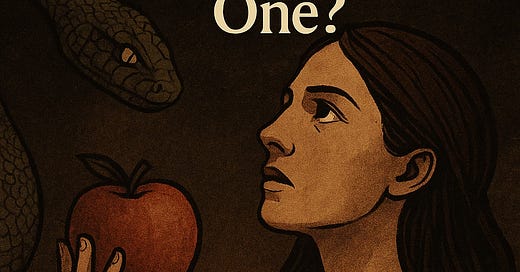We’ve been taught that Eve reached for the fruit out of weakness.
That she was deceived. Seduced. Silly.
That she fell for a lie—and dragged humanity down with her.
But what if the story is more complicated?
What if she didn’t just reach?
What if she reasoned?
What if Eve was the first human to ask a question?
The first to weigh a claim.
The first to act with agency—before Adam even spoke.
What if Eve wasn’t the symbol of weakness—
but the first flicker of courage in a world of silence?
She Didn’t Just Reach. She Chose.
The serpent didn’t trick Eve with fear.
He appealed to her mind.
“Did God really say…?”
“You will not certainly die…
…your eyes will be opened, and you will be like God, knowing good and evil.”
Eve engaged.
She looked.
She thought.
She considered.
And then, she chose.
No, it wasn’t perfect. It wasn’t painless.
But it wasn’t thoughtless, either.
The First Human to Think Critically
What if the point of the story wasn’t “Eve was wrong,”
but “growth is hard and costly—but necessary?”
What if the real danger wasn’t disobedience—but what happens when systems are so fragile they collapse under the weight of a single question?
We weren’t kicked out of Eden for sin.
We were kicked out because we couldn’t live in paradise and also be aware.
Eve didn’t ruin the story.
She started it.
Courage or Condemnation?
Eve was never just tempted by pleasure.
She was offered insight.
“You will be like God, knowing good and evil.”
What we’ve been taught to call sin,
might have been the first moment of spiritual courage.
She questioned authority.
She disrupted the order.
She challenged the limits of a world where obedience meant ignorance.
That’s not recklessness.
That’s the same kind of courage we celebrate in every prophet, every reformer, every protestor who dares to say: This can’t be all there is.
Why Did the Serpent Speak to Her?
Because she was the one who might listen.
The one not bound by silence.
The one not afraid to explore what wasn’t yet known.
And yes—it came at a cost.
Because knowledge always does.
But isn’t that the tension we all live in now?
We cannot unknow what we see.
We cannot go back to innocence once we’ve tasted awareness.
We cannot close our eyes to suffering, or injustice, or possibility—and pretend we’re still in Eden.
Eve’s story isn’t the fall.
It’s the beginning of the human condition:
The tension between safety and growth,
obedience and awareness,
faith and curiosity.
And she went first.
Not to ruin it for us.
But to show us what it means to choose.
What We Were Taught to Fear in Her
Eve didn’t just disobey.
She acted without permission.
She challenged the narrative.
She took initiative when silence was expected.
And that, more than the bite, is what threatened the system.
Because once a woman steps outside her assigned place,
the whole theology of inequality starts to shake.
Christian Nationalism doesn’t just teach that Eve sinned.
It teaches that she overstepped.
And that overstepping—thinking for herself, asking hard questions, wanting to know more—is reframed as seduction, manipulation, rebellion.
It becomes dangerous.
Not because it’s wrong—
but because it’s contagious.
We Were Taught to Fear in Her…
Curiosity – because questions unravel power
Discernment – because thinking disrupts hierarchy
Action – because obedience depends on passivity
Influence – because a woman who leads is a threat to every man taught to follow God by dominating her
It’s not her body they fear.
It’s her mind.
Her voice.
Her willingness to see through the rules and act anyway.
Eve isn’t dangerous because she sinned.
She’s dangerous because she chose.
What We Lost by Silencing Her
When we turned Eve into a warning instead of a mirror,
we didn’t just rewrite her story.
We rewrote our own.
We taught girls that their curiosity was dangerous.
We taught women that obedience was holiness.
We taught everyone that growth comes only after guilt.
And we built a theology where silence is safe,
where authority must not be questioned,
where obedience is love
and punishment is grace.
But what if Eve was the first to love honestly?
What if she saw the world not as a test to pass,
but as a mystery to explore?
What if her story was never meant to end in shame—
but in wisdom?
Eve didn’t fall.
She stepped forward.And we’ve spent centuries trying to punish every woman who does the same.
NEXT: The Projection of Punishment: Why Authoritarians See Empathy as a Threat




